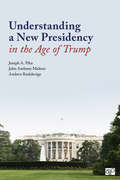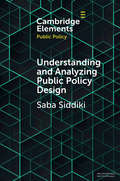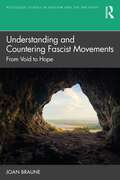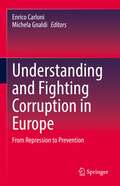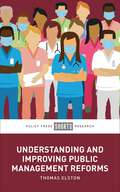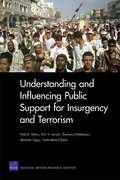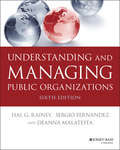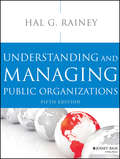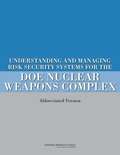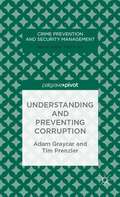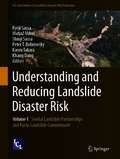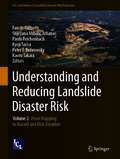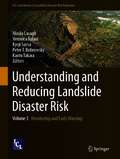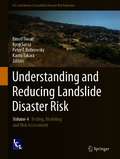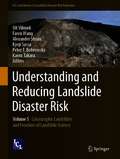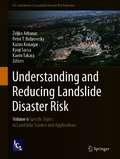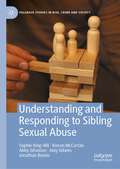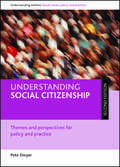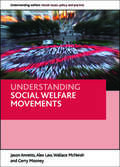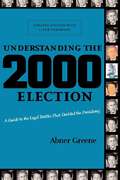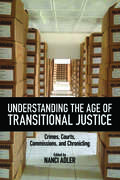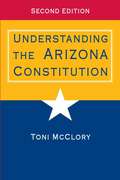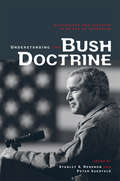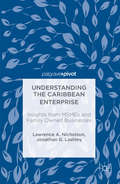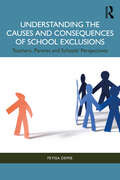- Table View
- List View
Understanding a New Presidency in the Age of Trump
by John Anthony Maltese Andrew Rudalevige Joseph A. PikaFrom the authors of The Politics of the Presidency comes this new supplement examining the unprecedented administration of Donald J. Trump. With their trademark balance between historical context, the current political environment, and contemporary scholarship on the executive branch, Joseph A. Pika, John Anthony Maltese, and Andrew Rudalevige offer students in American politics a brief but thorough overview of the Trump presidency’s first year of office. From the transition to the Russia investigation, Understanding a New Presidency in the Age of Trump grounds the ongoing news cycle in a deeper analysis of the executive branch, encouraging you to draw connections between current events and broader political science concepts. Whether packaged with another CQ Press title or used on its own, Understanding a New Presidency will give you the insight you need.
Understanding and Analyzing Public Policy Design (Elements in Public Policy)
by Saba SiddikiThere has been a surge in scholarship on policy design over the last ten years, as scholars seek to understand and develop existing concepts, theories, and methods engaged in the study of policy design in the context of modern governance. This Element adds to the current discourse on the study of policy design by (i) presenting behavioral assumptions and structural features of policy design; (ii) presenting a multi-level analytical framework for organizing policy design research; (iii) highlighting the role of policy compatibility and policy adaptability in influencing policy efficacy; and (iv) presenting future research recommendations relating to these topics.
Understanding and Countering Fascist Movements: From Void to Hope (Routledge Studies in Fascism and the Far Right)
by Joan BrauneThis book is based on the premise that understanding fascism is crucial for defeating it. Understanding and Countering Fascist Movements suggests fascism must be understood according to two “dimensions.” First, fascism is a social movement seeking power, always already connected to sources of power. Hence, fascism cannot be defeated by policing it as a crime problem, nor therapeutically treating it as a pathology of mental health. Second, fascists have cognitive and emotional needs they are seeking to fulfill through their participation in the movement, but the presence of these motivations must be held in tension with the fact that fascists are responsible for their choices and that these individual motivations also exist in a wider social context of capitalism and systems of supremacy. The book opens by examining some psychological elements of recruitment and disengagement from fascist movements, before addressing broader social narratives, concluding with the limitations of an approach that is grounded in the national security state that relies on individualized, perpetrator-centered interventions. Rejecting centrist paradigms that see fascism as “extremism” or “accelerationism,” Braune argues that fascism must be addressed in its specificity and uniqueness as an ideology and movement. Ultimately, she argues, fascism can only be defeated by countervailing social movements that not only demand radical social change but offer alternative spaces of belonging, community care, and the search for meaning. Understanding and Countering Fascist Movements is a philosophical contribution to antifascist theory and practice that will be appreciated by academics, students, and activists concerned about fascism today.
Understanding and Fighting Corruption in Europe: From Repression to Prevention
by Michela Gnaldi Enrico CarloniThe volume includes comparative and comprehensive discussions on anti-corruption policies of governments and anti-corruption agencies across Europe. Compared to existing literature that focuses either on general and theoretical aspects related to corruption or on country-specific experiences, this volume provides an interdisciplinary and broad overview of corruption prevention policies and measures undertaken by major European member states, relying both on literature and on institutional documentation of national anti-corruption agencies, which greatly contribute to shaping anti-corruption policy directions. In so doing, it advances the existing theoretical agenda of corruption studies and policies, situating it within wider disciplinary fields. This volume is especially concerned with the interrelationship between good administration, integrity, ethical behaviour and corruption; the role of transparency and digitalisation in preventing corruption and ensuring rights, efficiency and impartiality in the public administration; the measurement of corruption, with specific reference to preventative measures and indicators of administrative anti-corruption efforts; big data, block chains, and artificial intelligence; public management codes of ethics, performance targets and skills, and their role in tackling and preventing corruption; and public procurement, transparency and anti-bribery measures in the European public procurement system. This volume is of interest to graduate students and researchers in political sociology, political science, European corruption law, international relations, public policy, and social statistics.
Understanding and Improving Public Management Reforms
by Thomas ElstonWhy do top-down reforms to public services so often over-promise and under-deliver? Using five concepts from psychology, economics and organisational sociology, Thomas Elston addresses this pressing question of good governance. Rather than focusing on the challenge of implementation, Understanding and Improving Public Management Reforms reveals how flawed policy design is often the major contributor to reform failure. Cognitive bias, restrictive social institutions and inattention to ‘quiet costs’ during the policy-making process are essential to explaining the poor track record of reforms to date – and point the way towards better decision-making in future. Written for policy professionals, service managers, students and researchers alike, this concise, practical and multidisciplinary study draws on varied examples to help reconceive the perennial problem of public management reform – and to propose new solutions.
Understanding and Influencing Public Support for Insurgency and Terrorism
by Eric V. Larson Paul K. Davis Zachary Haldeman Mustafa Oguz Yashodhara RanaUsing and testing a conceptual model that draws on social science and particularly social movement theory, this volume examines public support for al-Qa’ida’s transnational jihadist movement, the Taliban insurgency in Afghanistan, the Kurdistan Workers Party (PKK) in Turkey, and the Maoist insurgency in Nepal. The authors discuss which factors were most salient across cases, how their importance varied in each case, and how this understanding can inform strategy.
Understanding and Managing Public Organizations (Essential Texts for Nonprofit and Public Leadership and Management)
by Hal G. Rainey Sergio Fernandez Deanna MalatestaDiscover the latest insights in organization theory from a comprehensive and masterful volume Understanding and Managing Public Organizations, 6th Edition provides readers with an authoritative reference for scholars, masters, and doctoral students in public management and public affairs programs in the United States and other nations. The 6th Edition of Understanding and Managing Public Organizations presents the latest research and insights from organization and management theory and their application to public organizations and the people in them. The book expands coverage from previous editions about organizational goals, performance and effectiveness, strategy, decision-making, structure and design, organizational change, operating environments, individuals and groups, motivation and work-related attitudes, leadership, teamwork, and more. Authors and professors Hal Rainey, Sergio Fernandez, and Deanna Malatesta provide new and expanded coverage of such topics as The context and distinctive character of public and nonprofit organizations, including expanded coverage of "publicness" and of the legal context including "state action" Performance management, measurement, organizational effectiveness, and managing for high performance Representative bureaucracy, workforce diversity, and performance Communication and information technology Employee engagement and empowerment, intrinsic motivation, self-determination theory, public service motivation, and positive organizational behavior—resilience, self-efficacy, optimism, and hope Recent developments in theory and thought on leadership, including authentic leadership, shared leadership, servant leadership, and integrated leadership Design and process topics including red tape and green tape, administrative burdens, and organizational routines Theoretical perspectives such as behavioral theory of decision making, resource dependence theory, and others, and their implications for public and nonprofit organizations Advances in theory and practice about rapid developments in collaborative governance, organizational networks, partnerships, and contracting Since the book is used in courses for students in numerous public affairs programs, this new edition updates the Instructor’s Guide, with new and revised PowerPoint slides, cases, exercises, and discussion and examination questions These materials, with the topics in the chapters, are designed to address the learning outcomes required by NASPAA accreditation requirements Belonging on the shelf of scholars and students in public affairs, as well as anyone interested in public management or organization theory, this new edition of Understanding and Managing Public Organizations provides an advanced and comprehensive enhancement to a widely used and compelling series of previous editions.
Understanding and Managing Public Organizations (Essential Texts for Nonprofit and Public Leadership and Management)
by Hal G. RaineyUNDERSTANDING AND MANAGING PUBLIC ORGANIZATIONS, FIFTH EDITION “This is the definitive place for all serious students of public administration to start. It is the most comprehensive book in the field. It is required reading for MPA students, Ph.D. students, and all scholars in the field.” —Kenneth J. Meier, Charles H. Gregory Chair in Liberal Arts, Texas A&M University “This is the bible for public management scholarship. It is the first place to turn when looking for an accessible but rigorous analysis of research on basic aspects of organizational life in the public sector, such as how culture, leadership, and motivation matter. The interdisciplinary array of research on public management has become so voluminous as to seem overwhelming at times. Rainey’s extraordinary curatorial prowess allows him to turn these fragments of work into a coherent and insightful body of knowledge. Anyone interested in how research can inform governance should start with this book.” —Donald Moynihan, professor of public affairs, Robert M. La Follette School of Public Affairs, University of Wisconsin—Madison “This is the Encyclopedia Britannica of public management; if you want to find out what has been written, and what is collectively said about the practice and theory of public management, look no further than Rainey’s updated and comprehensive fifth edition.” —Richard M. Walker, chair professor of public management and associate dean, City University of Hong Kong “For more than a decade, Rainey’s book has been a must-read for everyone in the community of public management in Korea, just like in many places all over the world. Undoubtedly, it provides a valuable resource for researchers and students who are interested in public management and applications of organization theory to public organizations. It is quite simply the best investigation of public organization and management that I’ve read.” —Young Han Chun, associate dean, Graduate School of Public Administration, Seoul National University
Understanding and Managing Risk in Security Systems for the Doe Nuclear Weapons Complex: (Abbreviated Version)
by National Research Council of the National AcademiesA nuclear weapon or a significant quantity of special nuclear material (SNM) would be of great value to a terrorist or other adversary. It might have particular value if acquired from a U.S. facility--in addition to acquiring a highly destructive tool, the adversary would demonstrate an inability of the United States to protect its nuclear assets. The United States expends considerable resources toward maintaining effective security at facilities that house its nuclear assets. However, particularly in a budget-constrained environment, it is essential that these assets are also secured efficiently, meaning at reasonable cost and imposing minimal burdens on the primary missions of the organizations that operate U.S. nuclear facilities. It is in this context that the U.S. Congress directed the National Nuclear Security Administration (NNSA)--a semi-autonomous agency in the U.S. Department of Energy (DOE) responsible for securing nuclear weapons and significant quantities of SNM--asked the National Academies for advice on augmenting its security approach, particularly on the applicability of quantitative and other risk-based approaches for securing its facilities. In carrying out its charge, the committee has focused on what actions NNSA could take to make its security approach more effective and efficient. The committee concluded that the solution to balancing cost, security, and operations at facilities in the nuclear weapons complex is not to assess security risks more quantitatively or more precisely. This is primarily because there is no comprehensive analytical basis for defining the attack strategies that a malicious, creative, and deliberate adversary might employ or the probabilities associated with them. However, using structured thinking processes and techniques to characterize security risk could improve NNSA's understanding of security vulnerabilities and guide more effective resource allocation.
Understanding and Preventing Corruption
by Tim Prenzler Adam GraycarGraycar and Prenzler present a readily accessible guide to the issues of public and private sector corruption, outlining the nature and dimensions of corruption problems in a variety of settings across the world, and providing a set of practical strategies to prevent corruption that also facilitate economic growth and development.
Understanding and Reducing Landslide Disaster Risk: Volume 1 Sendai Landslide Partnerships and Kyoto Landslide Commitment (ICL Contribution to Landslide Disaster Risk Reduction)
by Peter T. Bobrowsky Kyoji Sassa Matjaž Mikoš Khang Dang Kaoru Takara Shinji SassaThis book is a part of ICL new book series “ICL Contribution to Landslide Disaster Risk Reduction” founded in 2019. Peer-reviewed papers submitted to the Fifth World Landslide Forum were published in six volumes of this book series. This book contains the followings:• Four Forum lectures and one award paper• Sendai Landslide Partnerships, Kyoto Landslide Commitment, and International Programme on Landslides.• Landslide-induced tsunamis• Landslides at UNESCO designates sites and contribution from WMO, FAO, and IRDR• Education and Capacity Development for Risk Management and Risk GovernanceProf. Kyoji Sassa is the Founding President and the Secretary-General of International Consortium on Landslides (ICL). He has been the Editor-in-Chief of International Journal Landslides since its foundation in 2004.Prof. Matjaž Mikoš is the Vice President of International Consortium on Landslides and Vice President of Slovenian Academy of Engineering. He is a Professor and Dean of Faculty of Civil and Geodetic Engineering, University of Ljubljana, Slovenia.Dr. Shinji Sassa is Head of Soil Dynamics Group and Research Director of International Research Center for Coastal Disasters, Port and Airport Research Institute, National Institute of Maritime, Port and Aviation Technology, Japan.Prof. Peter Bobrowsky is the President of International Consortium on Landslides. He is a Senior Scientist of Geological Survey of Canada, Ottawa, Canada.Prof. Kaoru Takara is the Executive Director of International Consortium on Landslides. He is a Professor and Dean of Graduate School of Advanced Integrated Studies (GSAIS) in Human Survivability (Shishu-Kan), Kyoto University.Dr. Khang Dang is the Secretary General of the Fifth World Landslide Forum. He also serves as the Research Promotion Officer of ICL and a Lecturer at the University of Science, Vietnam National University, Hanoi.
Understanding and Reducing Landslide Disaster Risk: Volume 2 From Mapping to Hazard and Risk Zonation (ICL Contribution to Landslide Disaster Risk Reduction)
by Peter T. Bobrowsky Kyoji Sassa Fausto Guzzetti Kaoru Takara Snježana Mihalić Arbanas Paola ReichenbachThis book is a part of ICL new book series “ICL Contribution to Landslide Disaster Risk Reduction” founded in 2019. Peer-reviewed papers submitted to the Fifth World Landslide Forum were published in six volumes of this book series. This book contains the followings:• Keynotes• Landslide detection, recognition and mapping• Landslide susceptibility assessment and modelling• Landslide size statistics and temporal modelling• Data and information for landslide disaster mitigation• Vulnerability to landslides of people, communities and the built environmentDr. Fausto Guzzetti is General Director of Office III – Technical and Scientific Activities for Risk Forecasting and Prevention, Department of Civil Protection, Italian Presidency of the Council of Ministers, on leave from the Italian National Research Council.Prof. Snježana Mihalić Arbanas is a Full Professor of the Faculty of Mining, Geology and Petroleum Engineering of the University of Zagreb, Croatia. She is the Chair of ICL Network Committee.Paola Reichenbach is a Senior Researcher of the Research Institute for Geo-Hydrological Protection, an institute of the Italian National Research Council (IRPI-CNR), Perugia, Italy.Prof. Kyoji Sassa is the Founding President and the Secretary-General of the International Consortium on Landslides (ICL). He has been the Editor-in-Chief of International Journal Landslides since its foundation in 2004.Prof. Peter Bobrowsky is the President of the International Consortium on Landslides. He is a Senior Scientist of Geological Survey of Canada, Ottawa, Canada.Prof. Kaoru Takara is the Executive Director of the International Consortium on Landslides. He is a Professor and Dean of Graduate School of Advanced Integrated Studies (GSAIS) in Human Survivability (Shishu-Kan), Kyoto University.
Understanding and Reducing Landslide Disaster Risk: Volume 3 Monitoring and Early Warning (ICL Contribution to Landslide Disaster Risk Reduction)
by Peter T. Bobrowsky Kyoji Sassa Nicola Casagli Kaoru Takara Veronica TofaniThis book is a part of ICL new book series “ICL Contribution to Landslide Disaster Risk Reduction” founded in 2019. Peer-reviewed papers submitted to the Fifth World Landslide Forum were published in six volumes of this book series. This book contains the followings:• One theme lecture and one keynote lecture• Monitoring and remote sensing for landslide risk mitigation, including one keynote lecture• Landslide early warning systems, forecasting models and time prediction of landslidesProf. Nicola Casagli is a Vice President and President-elect of the International Consortium on Landslides (ICL) for 2021–2023. He is Professor of engineering geology at the Department of Earth Sciences, University of Florence, and President of the National Institute of Oceanography and Applied Geophysics – OGS, Trieste, Italy.Dr. Veronica Tofani is an Associate Professor at the Department of Earth Sciences, University of Florence, and Program Coordinator of the UNESCO Chair on Prevention and Sustainable Management of Geo-hydrological hazards, University of Florence.Prof. Kyoji Sassa is the Founding President and the Secretary-General of the International Consortium on Landslides (ICL). He has been the Editor-in-Chief of International Journal Landslides since its foundation in 2004.Prof. Peter Bobrowsky is the President of the International Consortium on Landslides. He is a Senior Scientist of Geological Survey of Canada, Ottawa, Canada.Prof. Kaoru Takara is the Executive Director of the International Consortium on Landslides. He is a Professor and Dean of Graduate School of Advanced Integrated Studies (GSAIS) in Human Survivability (Shishu-Kan), Kyoto University.
Understanding and Reducing Landslide Disaster Risk: Volume 4 Testing, Modeling and Risk Assessment (ICL Contribution to Landslide Disaster Risk Reduction)
by Peter T. Bobrowsky Kyoji Sassa Binod Tiwari Kaoru TakaraThis book is a part of ICL new book series “ICL Contribution to Landslide Disaster Risk Reduction” founded in 2019. Peer-reviewed papers submitted to the Fifth World Landslide Forum were published in six volumes of this book series. This book contains the followings:• Five keynote lectures• Recent development in physical modeling of landslides• Recent development in numerical modeling of landslides• Recent development in soil and rock testing techniques, application and analysis methods• Recent advancements in the methods of slope stability and deformation analyses• Recent development in disaster risk assessmentProf. Binod Tiwari is a Vice President of the International Consortium on Landslides (ICL). He is the Associate Vice President for research and sponsored project and Professor of civil and environmental engineering at the California State University, Fullerton, California, USA.Prof. Kyoji Sassa is the Founding President and the Secretary-General of the International Consortium on Landslides (ICL). He has been the Editor-in-Chief of International Journal Landslides since its foundation in 2004.Prof. Peter Bobrowsky is the President of the International Consortium on Landslides. He is a Senior Scientist of Geological Survey of Canada, Ottawa, Canada.Prof. Kaoru Takara is the Executive Director of the International Consortium on Landslides. He is a Professor and Dean of Graduate School of Advanced Integrated Studies (GSAIS) in Human Survivability (Shishu-Kan), Kyoto University.
Understanding and Reducing Landslide Disaster Risk: Volume 5 Catastrophic Landslides and Frontiers of Landslide Science (ICL Contribution to Landslide Disaster Risk Reduction)
by Peter T. Bobrowsky Fawu Wang Alexander Strom Kyoji Sassa Vít Vilímek Kaoru TakaraThis book is a part of ICL new book series “ICL Contribution to Landslide Disaster Risk Reduction” founded in 2019. Peer-reviewed papers submitted to the Fifth World Landslide Forum were published in six volumes of this book series. This book contains the followings:Part I with topics is mainly about landslides and earthquakes; landslide dams and outburst floods; catastrophic large-scale landslides in mountainous regions.Part II with topics is mainly about impact of climate change; loess landslides; mapping, monitoring and modeling of landslides; stabilization and mitigation; application of new technology in landslide studies.Prof. Vít Vilímek is the vice-president of the International Consortium on Landslides (ICL) and a member of the evaluation committee, Editor-in-Chief of the university journal AUC Geographica and Associate Editor-in-Chief of the international journal Geoenvironmental Disasters. He is a Professor of Physical Geography at Charles University, Prague, Czech Republic.Prof. Fawu Wang is the President of the International Consortium on Geo-disaster Reduction (ICGdR) and the Editor-in-Chief of the international journal Geoenvironmental Disasters. He is a Professor at the School of Civil Engineering, Tongji University, China.Dr. Alexander Strom is a chief expert at the Geodynamics Research Center LLC, Moscow, Russia. He is also an Adjunct Professor at Chang’an University, Xi’an, China, Visiting Professor at SKLGP, Chengdu, China, and an alternative representative of the JSC “Hydroproject Institute” in ICL.Prof. Kyoji Sassa is the Founding President and the Secretary-General of the International Consortium on Landslides (ICL). He has been the Editor-in-Chief of International Journal Landslides since its foundation in 2004.Prof. Peter Bobrowsky is the President of the International Consortium on Landslides. He is a Senior Scientist of Geological Survey of Canada, Ottawa, Canada.Prof. Kaoru Takara is the Executive Director of the International Consortium on Landslides. He is a Professor and Dean of Graduate School of Advanced Integrated Studies (GSAIS) in Human Survivability (Shishu-Kan), Kyoto University.
Understanding and Reducing Landslide Disaster Risk: Volume 6 Specific Topics in Landslide Science and Applications (ICL Contribution to Landslide Disaster Risk Reduction)
by Peter T. Bobrowsky Kyoji Sassa Željko Arbanas Kaoru Takara Kazuo KonagaiThis book is a part of ICL new book series “ICL Contribution to Landslide Disaster Risk Reduction” founded in 2019. Peer-reviewed papers submitted to the Fifth World Landslide Forum were published in six volumes of this book series. This book contains the following parts:• Impact of Large Ground Deformations near Seismic Faults on Critically Important Civil Infrastructures• Recent Progress in the Landslide Initiating Science• Earth Observation and Machine Learning in Landslide Science• General Landslide StudiesProfessor Željko Arbanas is the Vice President of International Consortium on Landslides. He is a Professor of Faculty of Civil Engineering, University of Rijeka, Croatia. He is the Assistant Editor-in-Chief of International Journal Landslides.Professor Peter Bobrowsky is the President of International Consortium on Landslides. He is a Senior Scientist of Geological Survey of Canada, Ottawa, Canada.Professor Kazuo Konagai is Professor Emeritus at the University of Tokyo and Principal Researcher at the ICL Headquarters. He serves as the Secretary-General of the Fifth World Landslide Forum.Professor Kyoji Sassa is the Founding President and the Secretary-General of the International Consortium on Landslides (ICL). He has been the Editor-in-Chief of International Journal Landslides since its foundation in 2004.Professor Kaoru Takara is the Executive Director of International Consortium on Landslides. He is a Professor and Dean of Graduate School of Advanced Integrated Studies (GSAIS) in Human Survivability (Shishu-Kan), Kyoto University.
Understanding and Responding to Sibling Sexual Abuse (Palgrave Studies in Risk, Crime and Society)
by Kieran McCartan Amy Adams Sophie King-Hill Abby Gilsenan Jonathan BeavisSibling sexual abuse is believed to be the most common and long-lasting form of all intra-familial abuse, with estimates suggesting that it is five times more prevalent than parent-child sexual abuse. This book draws on unique research from two studies which examine the nature, impact and response to sibling sexual abuse in England and Wales. Given the complex and underreported nature of sibling sexual abuse there are questions surrounding whether current interventions are appropriate in helping victims/survivors, children and young people who have been harmed and their families. There is growing evidence that highlights a lack of appropriate practitioner guidance and training which then leads to insufficient support, impacting negatively on long term outcomes. This book offers significant findings for policy, practice, and community engagement. It is written by authors with that have expertise in criminology, psychology, public health, social science, social work and also front-line practitioner experience.
Understanding social citizenship: Themes and perspectives for policy and practice (Understanding Welfare: Social Issues, Policy and Practice)
by Peter DwyerThis updated and revised edition of Understanding social citizenship is still the only citizenship textbook written from a social policy perspective. It provides students with an understanding of the concept of citizenship in relation to UK, EU and global welfare institutions; covers a range of welfare debates and issues; explores inclusion and exclusion; combines analysis and discussion of social policies and uses easy-to-digest text boxes. The revised second edition contains new topical sections on 'Cameron's Conservatism' and the EU and A8/10 migration in the UK. The book is essential reading for undergraduates in social policy, sociology, social work, politics and citizenship, A/AS level students and their teachers, and those on access courses, foundation degrees and teacher training courses.
Understanding social welfare movements (Understanding Welfare: Social Issues, Policy and Practice)
by Alex Law Jason AnnettsContemporary social policy has never been more vigorously contested. Issues range from single-issue campaigns over housing, social care, hospital closures through to organised movements around disability, environment, health and education. However, the historical and contemporary role played by social movements in shaping social welfare has too often been neglected in standard social policy texts. Understanding social welfare movements is the first text to bring together social policy and social movement studies. Using actual case studies and written in an accessible and engaging style, it will attract a wide readership of undergraduate and postgraduate students, higher education teachers and researchers, stakeholders and activists. Introductory chapters examine the historical and theoretical relationship between state welfare and social movements. Subsequent chapters outline the historical contribution of various social movements to the creation of the welfare state relating to Beveridge's 'five giants' of idleness, ignorance, squalor, illness and want. The book then examines the contemporary challenge posed by 'new social movements' in relation to the family, discrimination, environment, and global social justice. The book provides a timely and much needed overview of the changing nature of social welfare as it has been shaped by the demands of social movements.
Understanding the 2000 Election: A Guide to the Legal Battles that Decided the Presidency
by Abner GreenePaperback Edition: Updated and with a New ForewordThe nation will not soon forget the drama of the 2000 presidential election. For five weeks we were transfixed by the legal clashes that enveloped the country from election night to the Gore concession. It was instant history, and will be studied by historians, lawyers, political scientists, media critics and others for years to come.Even for those who followed the events most closely, the legal twists and turns of the post-election struggles seemed at times bewildering. We witnessed manual recounts of election ballots, GOP federal court lawsuits challenging those recounts, two Florida Supreme Court opinions, lawsuits over butterfly and absentee ballots, questions about the role of the Florida legislature and the United States Congress in resolving presidential election disputes, and two United States Supreme Court decisions, the second of which finally handed the election to Bush. Although the 2000 Presidency was decided through much legal wrangling, one should not have to be a lawyer to understand how we came to have Bush rather than Gore as our President in that hotly contested election.Understanding the 2000 Election offers an accessible, comprehensive guide to the legal battles that finally gave George W. Bush the Presidency five weeks after election night. Meant to stand next to and clarify the numerous journalistic and personal accounts of the election drama, Understanding the 2000 Election offers a offers a step-by-step, non-partisan explanation and analysis of the major legal issues involved in resolving the presidential contest. The volume also offers a clear overview of the Electoral College, its history, what would be involved in switching over to a direct election, and the likely future of the Presidential electoral process. While some still decry the 2000 election outcome as the result of political manipulation rather than the rule of law, Greene shows that almost every legal conclusion of the post-election struggle can be understood through the application of legal principle, rather than politics.
Understanding the Age of Transitional Justice: Crimes, Courts, Commissions, and Chronicling (Genocide, Political Violence, Human Rights)
by Richard Ashby Wilson Timothy Williams Stephan Parmentier Nanci Adler William A. Schabas Christian Axboe Nielsen Vladimir Petrovic Jeremy Sarkin Mina Rauschenbach Maarten Van Craen Thijs B Bouwknegt Nicole L Immler Kjell AndersonSince the 1980s, an array of legal and non-legal practices—labeled Transitional Justice—has been developed to support post-repressive, post-authoritarian, and post-conflict societies in dealing with their traumatic past. In Understanding the Age of Transitional Justice, the contributors analyze the processes, products, and efficacy of a number of transitional justice mechanisms and look at how genocide, mass political violence, and historical injustices are being institutionally addressed. They invite readers to speculate on what (else) the transcripts produced by these institutions tell us about the past and the present, calling attention to the influence of implicit history conveyed in the narratives that have gained an audience through international criminal tribunals, trials, and truth commissions. Nanci Adler has gathered leading specialists to scrutinize the responses to and effects of violent pasts that provide new perspectives for understanding and applying transitional justice mechanisms in an effort to stop the recycling of old repressions into new ones.
Understanding the Arizona Constitution
by Toni MccloryThis book is the definitive guide to Arizona government and serves as a solid introductory text for classes on the Arizona Constitution. Extensive end notes make it a useful reference for professionals within the government. Finally, it serves as a tool for any engaged citizen looking for information about online government resources, administrative rules, and voter rights.
Understanding the Bush Doctrine: Psychology and Strategy in an Age of Terrorism
by Stanley A. Renshon Peter SuedfeldIn this volume, leading scholars of U.S. foreign policy, international relations, and political psychology examine one of the most consequential and controversial statements of national security policy in contemporary American history. Unlike other books which focus only on unilateralism or preventive war, Stanley A. Renshon and Peter Suedfeld provide a comprehensive framework with which to analyze the Bush Doctrine by identifying five central and interrelated elements of the doctrine: American pre-eminence assertive realism equivocal alliances selective multilateralism democratic transformation. Given its centrality to American national security, and the fact that the effects of it are likely to be felt well into the twenty-first century, Understanding the Bush Doctrine provides a critically balanced and pointed assessment of the Bush Doctrine and its premises, as well as a fair appraisal of its implications and prospects.
Understanding the Caribbean Enterprise
by Lawrence A. A. Nicholson Jonathan G. G. LashleyThis engaging book fills a substantial gap in the understanding of Caribbean enterprises, focusing upon FOBs (family-owned businesses) about which, despite accounting for 70% of private sector employment in the region, very little is known. Concentrating on MSMEs which represent the majority of FOBs in the English-speaking Caribbean, the authors compare and contrast their experiences to those in developed countries, focusing in particular on areas such as family business succession, business financing and marketing. Understanding the Caribbean Enterprise provides context-specific lessons from a historical perspective of business and entrepreneurship, which in turn provide an understanding of the current issues facing MSMEs and FOBs in the English-speaking Caribbean.
Understanding the Causes and Consequences of School Exclusions: Teachers, Parents and Schools' Perspectives
by Feyisa DemieThis book outlines a study of the causes and consequences of school exclusions. It explores the experiences of schools, teachers, parents, and governors and includes a focus on the experience of Black and minority ethnic students and those with special educational needs and disabilities. The book presents the results of detailed empirical research from English schools that studied teachers, school leaders, parents, governors, educational psychologists, and school staff experience with school exclusions. The book examines the scale of the problem and underlying factors, the disproportionality of exclusions for SEND and minority ethnic students, comparative international literature on exclusions and implications for policy, practice, and research. Providing a comprehensive overview of the factors affecting school exclusions, the book will be of great interest to researchers, academics, and students in the areas of education policy, inclusion and special education needs in education. It will also be of interest to policy makers and education professionals including special educational needs co-ordinators and headteachers.
